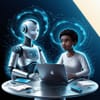Artificial intelligence is no longer just a tool we use—it’s increasingly becoming a co-creator in shaping our collective intelligence. From writing and art to business strategies and scientific research, AI is now playing an active role in generating ideas, solving problems, and influencing decisions. As this partnership between humans and machines grows stronger, we need to take a step back and consider what this means for our future—both the opportunities and the risks.
The idea that AI could be a “co-creator” might sound like science fiction, but it’s happening right now. AI systems are already collaborating with us in ways that enhance our cognitive abilities, making suggestions, offering insights, and even proposing creative solutions to problems. In fields like healthcare, AI is helping doctors make more accurate diagnoses; in entertainment, it’s enabling new forms of storytelling; and in business, it’s guiding strategic decisions. This collaborative intelligence is creating new possibilities, but it also raises some serious concerns about control and trust.
One of the biggest questions we need to ask is: who is really in charge? As AI systems become more advanced, they’re no longer just passive tools waiting for instructions—they’re actively shaping outcomes. For instance, AI can now write essays, develop software code, or even compose music. The line between what is "human" creativity and what is "machine" creativity is blurring, and that creates uncertainty. When AI becomes involved in the creative process, where do we draw the line between human and machine authorship? And how do we ensure AI-generated content aligns with our values, ethics, and interests?
The stakes are even higher when it comes to the business and political worlds. AI is increasingly helping shape public opinion, making decisions on everything from marketing strategies to hiring practices. This means that AI could be influencing the future of society in ways that are not fully transparent or understood. With AI now a key player in decision-making, we must consider how its influence could affect individual freedoms, economic opportunities, and social dynamics.
While AI holds incredible potential to amplify our intelligence and creativity, we must remain cautious. It's important to approach this collaboration thoughtfully, making sure we maintain oversight and accountability. We also need to be mindful of the biases that can be embedded in AI systems, which can inadvertently reinforce existing inequalities. As we continue to harness AI’s power, we must be vigilant about the potential risks and ensure that we’re using it to enhance—not replace—human agency.


